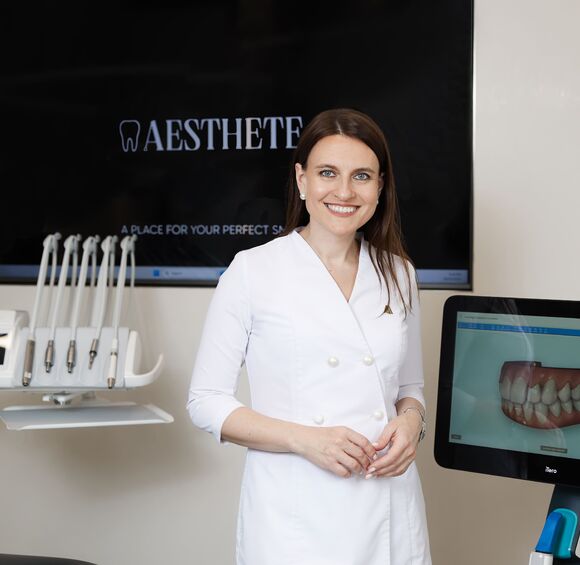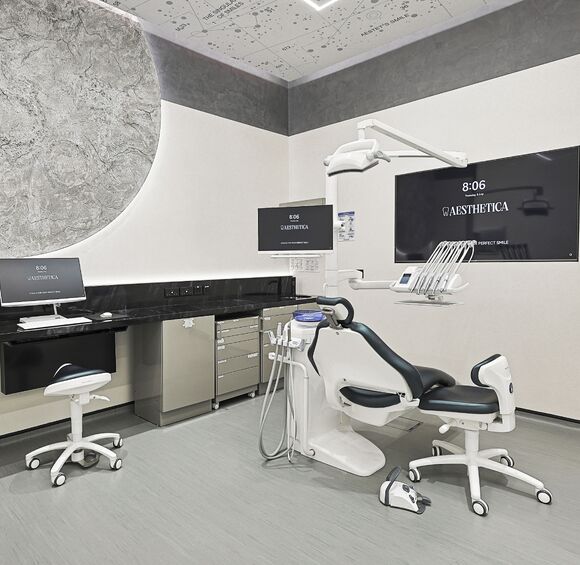AESTHETE Dental Clinic is a modern medical center located in Dubai (UAE) on Bluewaters Island. We provide professional care to patients in any situation. Here’s what to do if you accidentally swallow a dental implant or crown. The key is not to panic and, if possible, seek immediate assistance from an emergency room and a dentist. Do not dismiss this as a minor incident or attempt to ignore it.
How Can You Accidentally Swallow a Crown?
Many people use crowns—dental prosthetics placed on a pre-treated tooth or an implant, a metal post embedded in the jaw. These crowns are typically securely fixed and withstand significant chewing forces. However, in some cases, crowns can become loose and fail to stay in place, increasing the chance of swallowing them unexpectedly.
Common reasons why crowns or implants may come loose include:
- Improper installation protocol or other errors made by the dentist.
- Failure to follow dental care recommendations, particularly in the first few days after installation.
- Trauma, such as falls, blows, or other physical impacts.
- Dental diseases that compromise the stability of the prosthetic.
- Consumption of hard or sticky foods that can dislodge the crown.
- Long-term use of the crown, where the adhesive material may lose its holding strength over time.
This issue is more likely to occur with a temporary prosthetic, as these are designed to be removed relatively soon. As a result, the adhesive used for temporary crowns often has weaker retaining properties.
Actions to Take After Swallowing a Crown
In most cases, swallowing a dental crown does not pose a significant health risk. It will likely pass through the body naturally within 24–48 hours. However, it is best to consult a doctor to rule out complications. Moving forward, ensure regular dental checkups to prevent such incidents.
Assess the Situation
The first step is to understand exactly what happened. Inspect your mouth to determine whether the entire crown came off or just a fragment. The latter is more dangerous because sharp edges can damage the gastrointestinal tract. This is particularly concerning if the swallowed part includes the implant post.
If the entire crown was swallowed, it is less likely to cause harm due to its smooth surface and rounded shape. Monitor your condition and seek medical attention immediately if any of the following symptoms occur:
- Chest or abdominal pain or discomfort.
- Difficulty breathing or severe coughing.
- Trouble swallowing.
- Bleeding from the mouth or rectum.
- Constipation or bowel obstruction.
- Nausea or vomiting.
Additionally, monitor your stools to check if the crown passes naturally.
Visit an Emergency Room and Get an X-Ray
Even if you do not feel pain or discomfort, visiting an emergency room or a gastroenterologist is advisable. A dentist cannot diagnose below the neck.
Doctors may perform:
- X-rays to locate the crown.
- Endoscopy for a more detailed examination.
Based on the results, the doctor will decide the next steps, which may include:
- Enemas or stomach pumping to expedite removal.
- Endoscopic removal or surgical extraction if necessary.
It is critical to ensure the crown has not become lodged in the esophagus or airways, as this could require immediate removal to prevent choking or suffocation.
Adjust Your Diet
To help the crown pass naturally, make temporary adjustments to your diet:
- Eat foods high in fiber, such as fruits and vegetables.
- Drink plenty of liquids, such as water, juices, or light tea.
These measures prevent constipation, which could worsen the situation. Always discuss dietary changes with a doctor. In some cases, fasting until the crown exits the body may be recommended.
Important: Never attempt to induce vomiting. This could cause the crown to become lodged in the esophagus or result in injury, particularly if the crown has sharp edges.
Visit a Dentist
Whether you swallowed the entire crown or a fragment, it is essential to see your dentist. The absence of the crown can lead to issues such as:
- Aesthetic concerns.
- Difficulty chewing or biting.
- Speech problems.
- Gastrointestinal disorders.
- Jawbone atrophy due to the lack of normal dental function.
The dentist will examine the affected area and recommend a solution, such as a replacement crown. It is crucial that:
- The new crown is made from high-quality materials, such as metal-ceramics, E-Max ceramics, or zirconia.
- The crown is securely attached to avoid future detachment.
.jpg)
Potential Consequences
Swallowing a crown usually does not cause serious issues since the materials used are non-toxic. However, complications can arise, such as:
- Esophageal blockage: Difficulty swallowing and painful sensations.
- Airway blockage: Breathing difficulties or choking, which could be life-threatening.
- In the stomach or intestines:
- Perforation (puncture) of the walls.
- Internal bleeding.
- Partial or complete intestinal obstruction.
Even if no severe complications occur, the swallowed crown may still cause discomfort or pain. Early medical intervention minimizes risks and ensures a safe recovery.
Prevention
A crown will remain securely attached to the tooth or implant if it is properly installed. Choosing a clinic with experienced, highly qualified dentists is the key to minimizing the likelihood of problems.
Additionally, it is essential to follow your dentist’s recommendations after prosthetic treatment. The main guidelines include:
- Avoid hard, dry, or sticky foods or limit their consumption. Such products can damage or loosen the crown.
- Do not bite or chew hard objects, such as nails, pen tips, pencils, or markers.
- Never use your teeth to open bottles.
- Maintain proper oral hygiene: Brush your teeth twice a day using a toothbrush and toothpaste. Also, use an irrigator, mouthwash, and interdental brushes to thoroughly remove plaque from hard-to-reach areas.
.jpg)
If your dentist has advised routine check-ups, ensure you visit the clinic as scheduled. If you miss an appointment for a valid reason, reschedule as soon as possible.
If you notice the crown starting to loosen, do not wait until it becomes fully mobile or detaches. Visit your dentist immediately to have the crown repaired or replaced.
FAQ
How Long Can a Crown Stay in the Gastrointestinal Tract?
The duration depends on the material, size of the crown, and the patient’s individual characteristics. Generally, you should be concerned if the crown does not pass naturally within 3–4 days. However, even before this time frame, seek medical attention if any unusual symptoms appear.
What Symptoms Indicate a Problem After Swallowing a Crown?
You should visit an emergency room or consult a gastroenterologist if you experience:
- Abdominal or chest pain.
- Difficulty breathing or swallowing.
- Nausea, vomiting, or any other unusual symptoms.
How Can Swallowing a Crown Be Prevented in the Future?
- Regularly monitor the condition of your dental prosthetics and avoid exposing them to excessive force.
- During the initial period after installation, follow the schedule of preventive check-ups with your dentist.
- Be cautious with hard foods—avoid chewing nuts or hard candies.
- Avoid habits such as biting pen tips or pencils.
- Refrain from eating items like lollipops or crackers that could compromise the crown.
By adhering to these guidelines, you can reduce the risk of accidentally swallowing a crown.
Referense
- Prakash UBS, Cortese DA. Tracheobronchial foreign bodies. In: Prakash UBS, editor. Bronchoscopy. 2nd ed. New York: Raven Press; 1994. pp. 253–277.
- Cameron SM, Whitlock WL, Tabor MS. Foreign body aspiration in dentistry: a review. J Am Dent Assoc. 1996;127:1224–1229.
- J.G. De Souza et al. Accident in implant dentistry: involuntary screwdriver ingestion during surgical procedure. A clinical report














